The best hand sanders for wood and walls: 6 top choices for DIY projects
Manually-powered hand sanders for wood give DIYers more control, precision and finesse than its powered cousin, and cost less
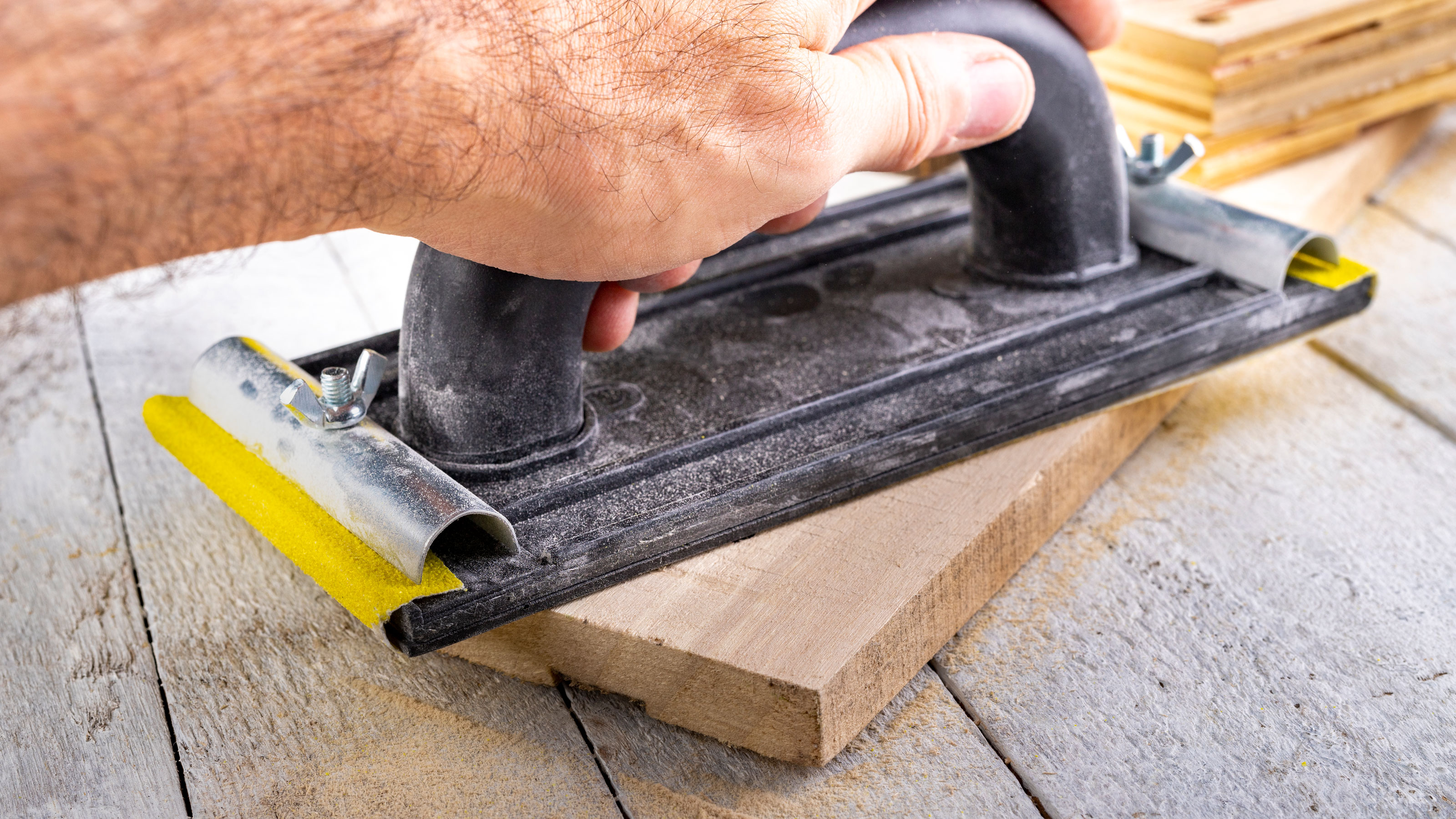
The best hand sanders for wood are manually powered meaning that you have more control over them when giving a wooden surface a rub down. You can choose how much pressure to apply, take control of sanding corners and a larger base covers more area in one action than most hand held power sanders.
Hand sanders are designed to hold a large strip of your chosen sandpaper grade, held firmly in place with a couple of clamps. A large easy grip handle gives you plenty of control over the sander, making it ideal for sanding wood by hand, including doors, windows, skirting boards, floors and wood panelling.
Variations in design mean you can stick them on the end of a pole and tackle hard to reach areas and sand down walls without the inconvenience of having to get up a ladder. Plus, there’s no need to look for a power supply or worry about your battery going flat and you’ll pay a lot less than you would for a power sander. Simply put, every DIYer should have one in their collection.
Here we pick six of the very best hand sanders for wood to help you choose which you’ll need for your next sanding project.
The Quick List
Want a quick overview of the hand sanders on our list before diving into the details? Use the handy quick links to jump to the hand sander you want to get a more detailed review.
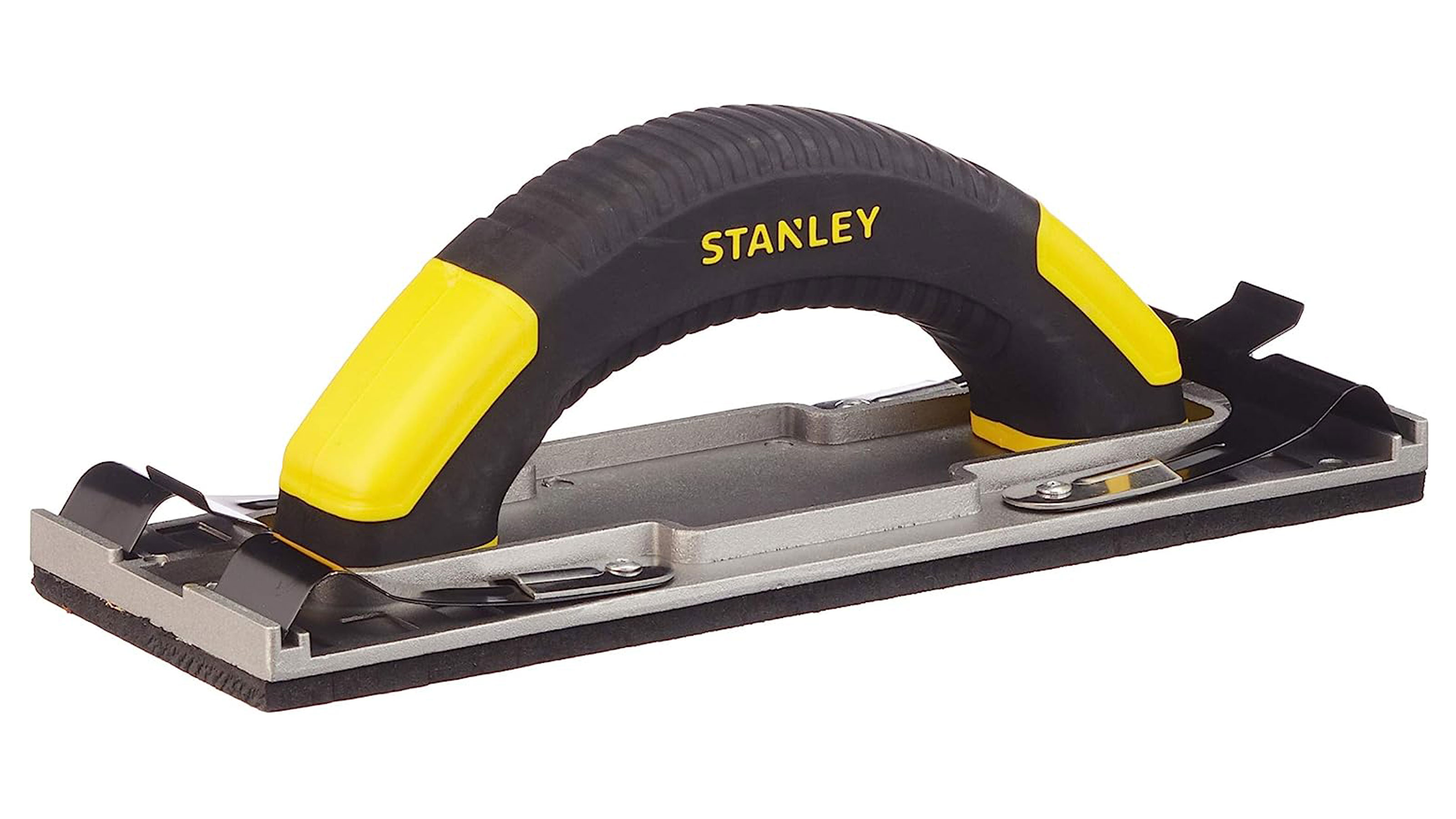
If you want a solid hand sander built by a reputable brand that can tackle the toughest of sanding jobs then this offering from Stanley has to be high on your list.
Read more below
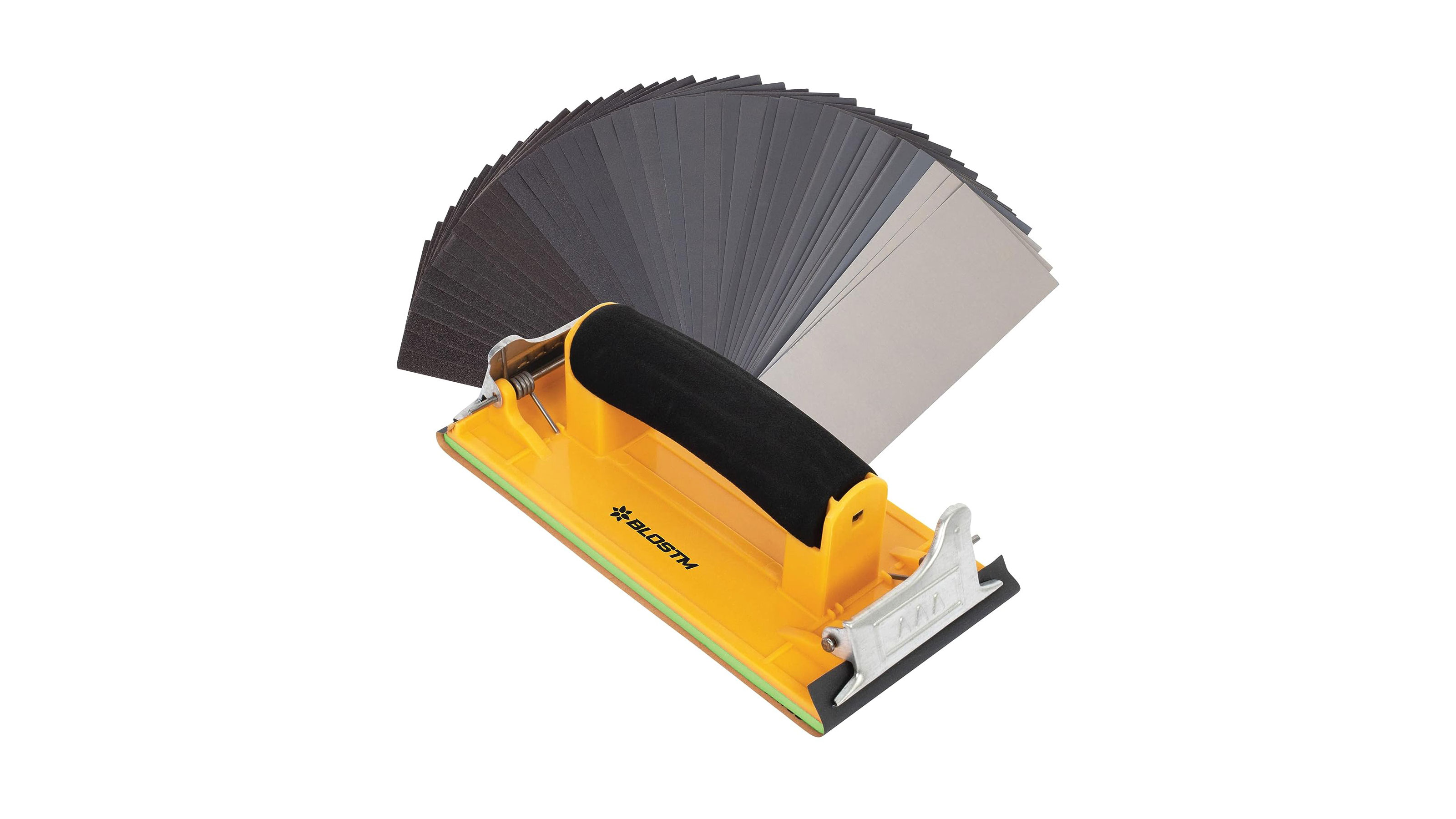
Finding sandpaper that fits the pad of a manual hand sander isn’t always easy. You can buy standard sized sandpaper sheets and cut to fit, but this isn’t a problem here.
Read more below
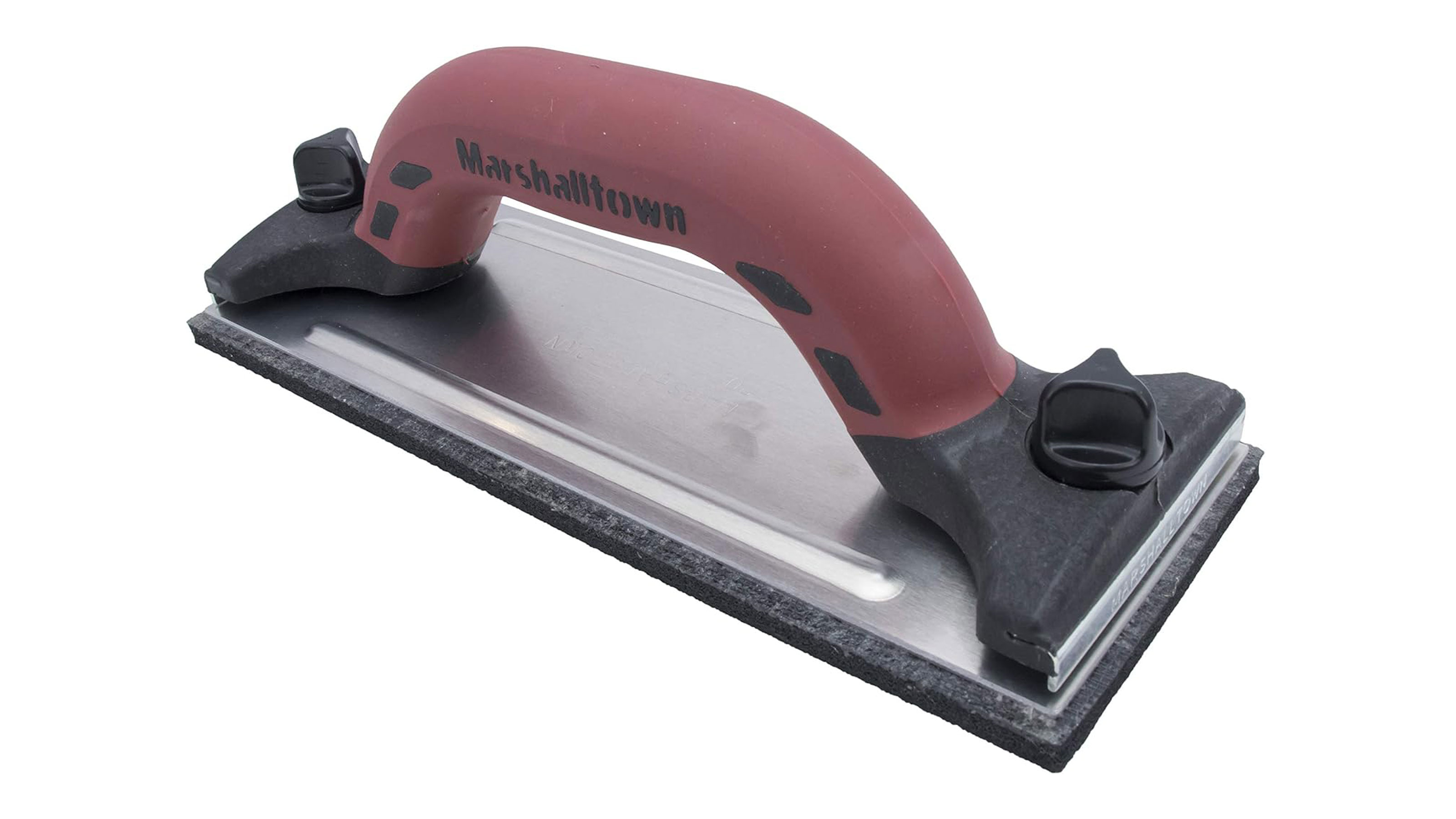
This is a well built hand sander that has a large handle that leaves plenty of room to get your hands around. This makes it a good choice for large hands, or those who want to wear heavy duty gloves.
Read more below
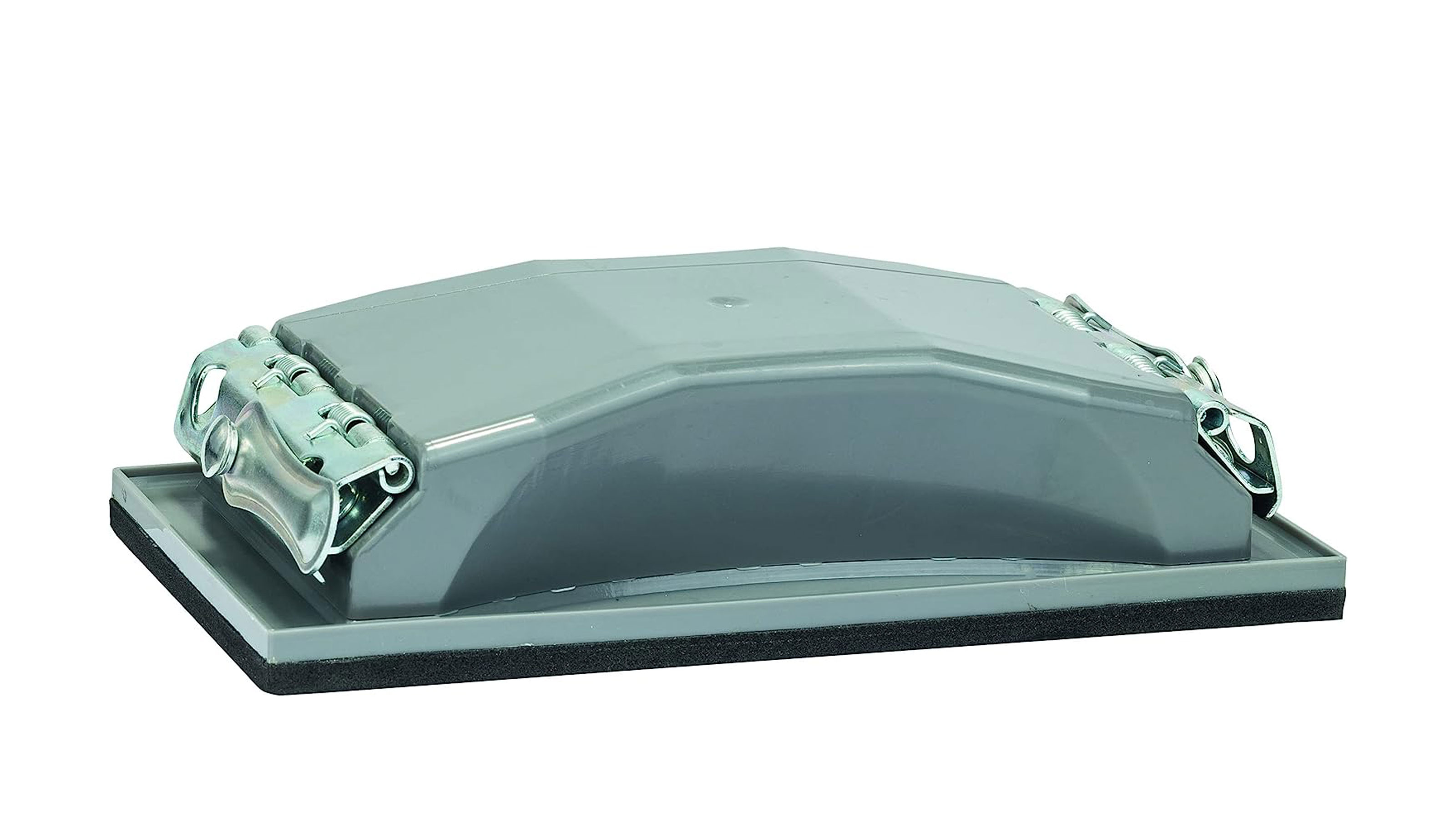
If you're looking for a tool for more subtle hand sanding, a hand held sanding block is a top choice. They typically have a smaller sanding surface and are shaped to fit into the palm of the hand.
Read more below
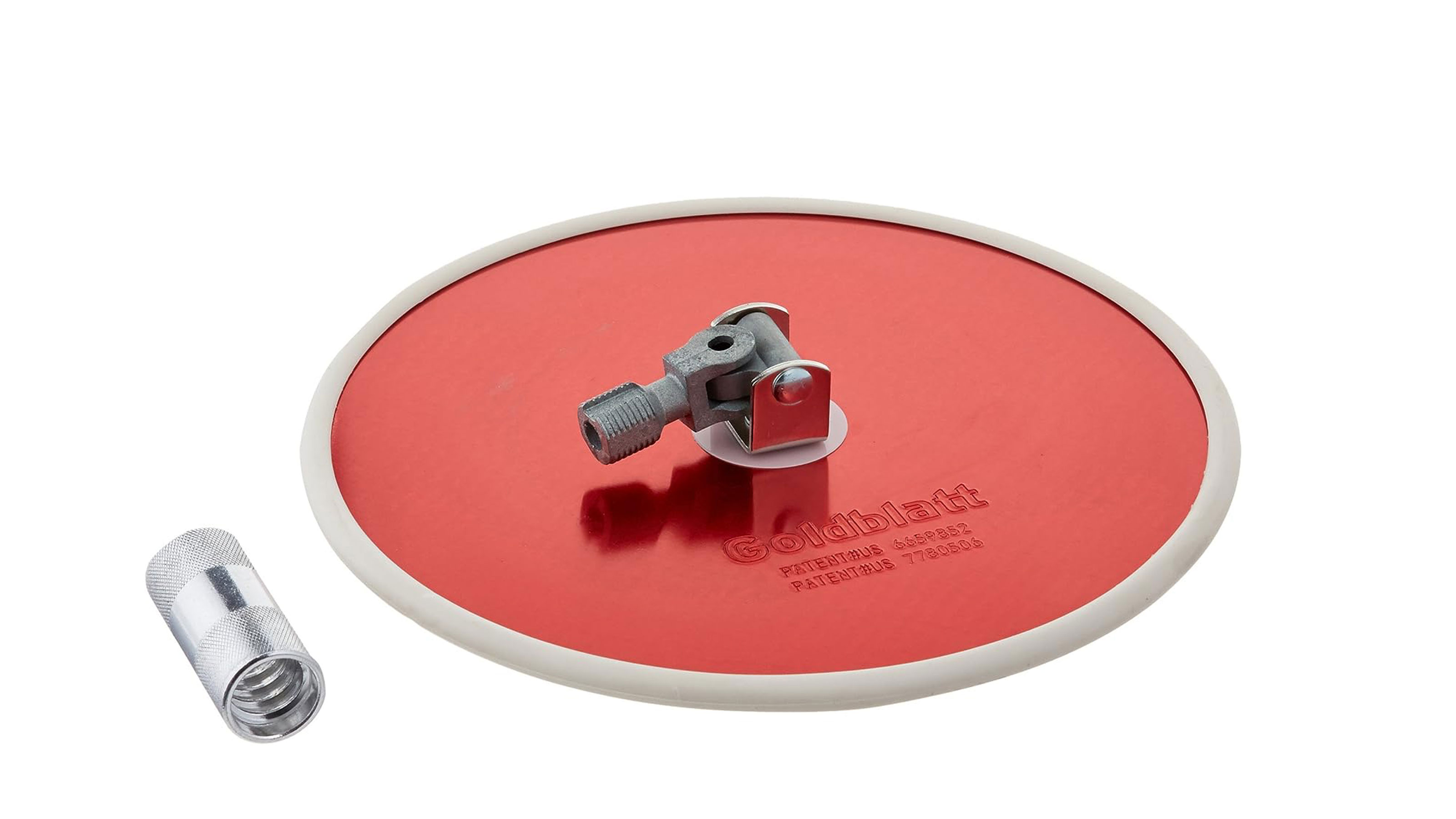
Don’t fancy getting up a ladder to sand down a surface then this radial sander could be just what you need. Radial sanders have a round sanding pad, which you attach to a pole giving you access to hard to reach areas.
Read more below
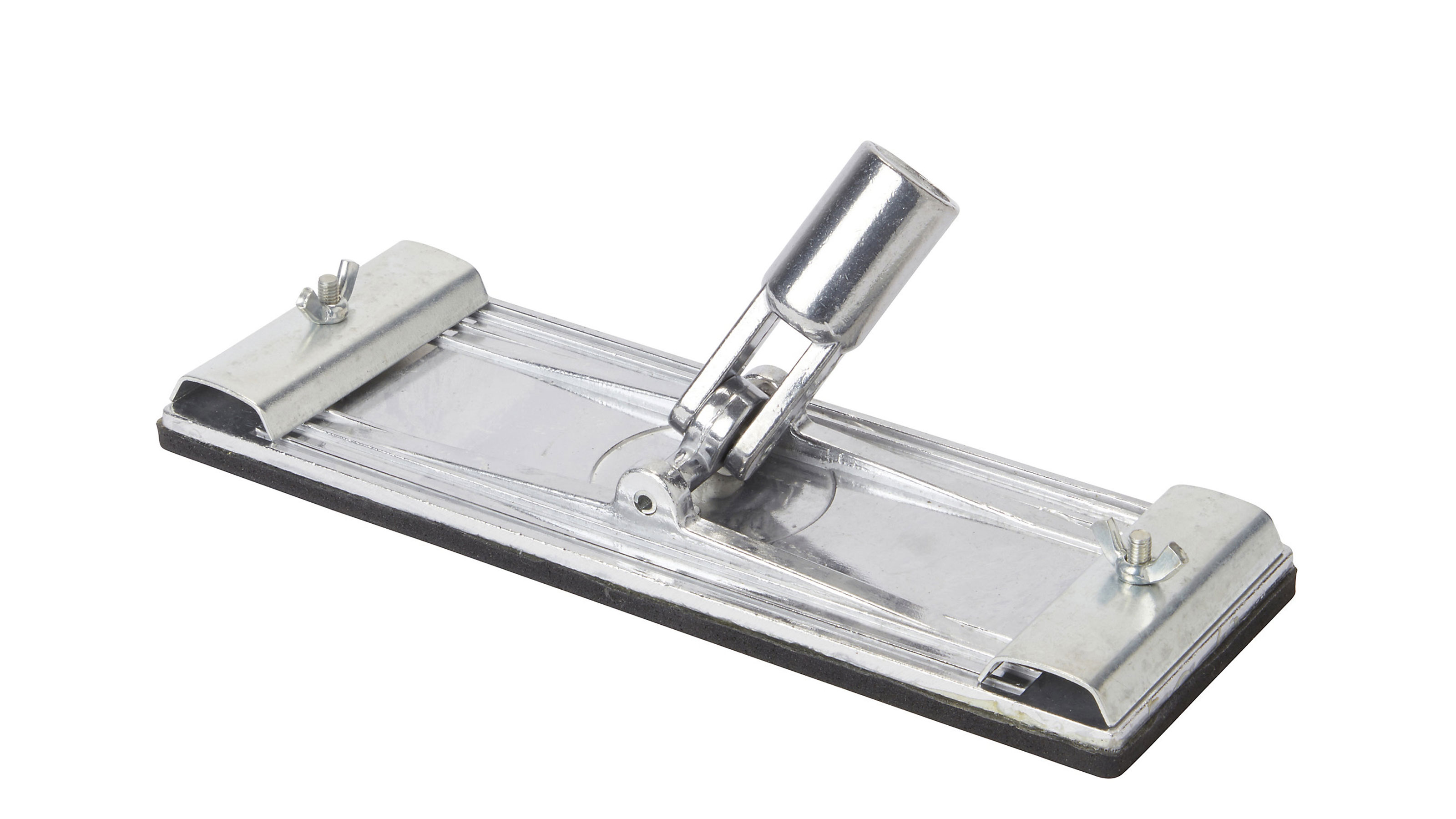
This sander head is effectively a standard hand sander without the handle. Instead it has a 360 degree omnidirectional swivel bracket that's attached to a telescopic extension pole. Great for wall and floors.
Read more below
Best overall hand sander for wood

1. Stanley 230mm x 80mm Hand Sander
Specifications
Reasons to buy
Reasons to avoid
If you want a solid hand sander built by a reputable brand that can tackle the toughest of sanding jobs then this offering from Stanley has to be high on your list. Not only does it have a strong ribbed aluminium body and a comfortable rubber grip that gives users good grip and control, it's also one of the cheapest in this buying guide.
It has a 230mm x 80mm pad that is slightly smaller than most hand sanders, but the difference in size isn’t a big deal. Standard size sandpaper sheets can be cut to fit with little or no waste, or you can opt for slightly more expensive specialist sanding sheets, but these aren’t always easy to find in your local hardware store.
Alternatively, you can use a sanding mesh like this ProDec Advance 120 Grit Sanding Mesh from Amazon. But again you will need to cut to fit. But fitting is easy thanks to its lift and grip clamps. No need to worry about unscrewing and screwing nuts, with this style clamp it is done in half the time.
Best hand sander with pre cut sandpaper

2. BLOSTM Sanding Block Sander
Specifications
Reasons to buy
Reasons to avoid
Finding sandpaper that fits the pad of a manual hand sander isn’t always easy. You can buy standard sized sandpaper sheets and cut to fit, but this often leaves wastage and can be frustrating. This isn’t a problem you will have with this set. This BLOSTM Sanding Block Sander set comes with its own 48 pieces of sandpaper pre-cut to fit perfectly on the 230mm x 90mm sanding pad.
However you get a selection of sandpaper grits from 120 - 7000, which will leave you with a lot of super fine sheets that aren’t much use for general DIY. On the plus side you can buy brand specific replacement sheets, but again you have the same problem.
The sandpaper that comes with the block does a decent job and the sheets are easy to fix to the block thanks to its spring loaded clamps. However to keep the cost of the set down the build quality of the hand sander doesn’t match up with some of the more robust offerings in this guide.
Best well built hand sander for wood

3. Marshalltown 20 Hand Sander
Specifications
Reasons to buy
Reasons to avoid
This is a well built hand sander that has a large handle that leaves plenty of room to get your hands around. This makes it a good choice for those with large hands, or those who want to wear heavy duty gloves to protect their hands when sanding.
The sander has a DuraSoft handle, which means it is relatively soft to the touch, but strong, comfortable and provides plenty of grip. A flexible aluminium backing plate is bonded to a 245 x 85mm foam pad which gives you slightly more sanding surface than most hand sanders. The unit is nicely weighted and feels like real quality in the hand.
Strong metal clamps are neatly integrated into the handle and use neat little handles that are easy to tighten and ensure that any sandpaper stays put when sanding.
Best hand sanding block

4. Bosch Professional Hand Sanding Block
Specifications
Reasons to buy
Reasons to avoid
If you're looking for a tool for more subtle hand sanding, a hand held sanding block is a top choice. They typically have a smaller sanding surface and are shaped to fit into the palm of the hand and this is exactly what you get with this Bosch Professional Hand Sanding Block.
The 160 x 85 mm pad means that it is easier to control, but doesn’t cover as much area, which makes it ideal for finishing jobs on smaller or more intricate faces i.e panels on a panel door. And the square edges will make it good for getting into corners.
The grip is good, but not as good as a regular hand sander like the Marshalltown 20 Hand Sander, meaning it's not such a good choice for heavy duty sanding. But it can double up as a wall sander for rubbing down small filled cracks. The lever mechanism to secure the sandpaper works well, but the constant back and forth motion can eventually cause the screws holding it in place to come loose.
Best radial hand sander for wood

5. Goldblatt Vortex Drywall Sander
Specifications
Reasons to buy
Reasons to avoid
Don’t fancy getting up a ladder to sand down a surface then this radial sander could be just what you need. Radial sanders have a round sanding pad, which you attach to a pole giving you access to hard to reach areas.
This radial sander has a large 23cm diameter which works well on its central pivot point. The shape means it distributes the power you put in evenly and doesn’t suddenly divert somewhere you don't want it to go.
A hook and loop system – like velcro – ensures that sandpaper is secure and won't fall off the pad when in use. Unlike standard hand sanders you can get readily available sandpaper discs that fit perfectly on the pad. Designed to work on drywall, it works just as well on floorboards, but one drawback is its circular shape, meaning you can’t get into corners, so will need another tool to finish a job.
Best hand sander for floors and walls

6. GoodHome sander head
Specifications
Reasons to buy
Reasons to avoid
Say goodbye to ladders and say hello to quick sanding of large areas without getting a backache or neck ache. This sander head is effectively a standard hand sander without the handle. Instead it has a 360 degree omnidirectional swivel bracket that needs to be attached to a telescopic extension pole. The larger the extension pole the higher or further you can reach.
The head can be hard to control as it easily swivels in every direction and the pole occasionally comes loose. But once you mastered the action the head works well and neatly gets into corners. The pad is very similar in size to standard hand sanders so you will struggle to find sandpaper that's an exact fit. But simply cut up standard sheets of sandpaper and this will prove to be a very useful addition for sanding floors and walls.
How to choose the best hand sander for wood
When on the lookout for a hand sander you need to consider what you want to use it for. Is it going to just be wood such as doors, and skirting boards? Or are you looking to use it on wooden floors and hard to reach areas? And, is it easy to get sandpaper to fit?
What type of hand sander do I need?
For general purpose hand sanding you are best using a standard hand sander like the Stanley 230mm x 80mm Hand Sander in our buying guide. This is ideal for tackling finishing jobs on wood with large flat areas, tougher paint removal tasks and edges on floors.
A sanding block does a very similar job, but is more suited to smaller finishing jobs, it's not so well suited to tougher tasks. A pole sander is a good choice for finishing floors or hard to reach areas and can double up as a wall sander.
Size of pad
Hand sanders come in different sizes, so it's important to note when buying sandpaper. The pad size doesn’t vary greatly on standard hand sanders, but smaller pads will be 230mm x 80mm, while larger pads can be longer and wider.
Standard sandpaper sheets are 280mm x 230mm, which means you can cut to fit. You can just about get three sheets out of a single sheet on 80mm wide hand sanders. On larger sanders you will get two. Alternatively, you can buy sanding block sandpaper which typically fits all size sanders, but usually costs more.
Handle and grip
Standard hand sanders have a grip that’s easy to get your hand around and can accommodate most hand sizes. This gives you plenty of control for jobs that need fine sanding like rubbing down new wooden doors. But they are also good for tougher jobs such as removing paint as you can grab the handle tightly. Also consider the material of the handle, i.e does it have a rubber grip to get a secure hold of the handle.
Sanding blocks and pole sanders are slightly different. You need a sanding block that fits neatly into your hand to get a good grip so if you have small or large hands you won’t get as much control. Pole sanders attach to a pole so you need to make sure that you get a handle that fits the sander head and one with a good rubber grip for greater control.
What clamps does the sander have?
There’s effectively two choices and both have their pros and cons. There’s the hand sanders with a wing nut which you need to unscrew, add your sandpaper and tighten on both ends each time. But this ensures you can get a strong fit.
Other hand sanders have lift and grab clamps which are easier to use, but you have no control over the grip of the sandpaper and after a while lose their holding strength.
How we review hand sanders
At Homebuilding.co.uk we like to get our hands on as many products as possible and give them a thorough workout before we recommend a product. It's not always possible to try every product and this is where our expansive knowledge of brands help us choose products and give you the essential information you need.
When we can’t get hands-on experience with a product we call upon the many experts and trades who have contributed to the Homebuilding brand. They help out with suggestions and recommendations. Then we scour user reviews to see what the average consumer thinks about a product and bring all this together to help you make the right decision when choosing a product.
Get the Homebuilding & Renovating Newsletter
Bring your dream home to life with expert advice, how to guides and design inspiration. Sign up for our newsletter and get two free tickets to a Homebuilding & Renovating Show near you.
Steve Jenkins is a freelance content creator with over two decades of experience working in digital and print and was previously the DIY content editor for Homebuilding & Renovating.
He is a keen DIYer with over 20 years of experience in transforming and renovating the many homes he has lived in. He specialises in painting and decorating, but has a wide range of skills gleaned from working in the building trade for around 10 years and spending time at night school learning how to plaster and plumb.
He has fitted kitchens, tiled bathrooms and kitchens, laid many floors, built partition walls, plastered walls, plumbed in bathrooms, worked on loft conversions and much more. And when he's not sure how to tackle a DIY project he has a wide network of friends – including plumbers, gas engineers, tilers, carpenters, painters and decorators, electricians and builders – in the trade to call upon.

